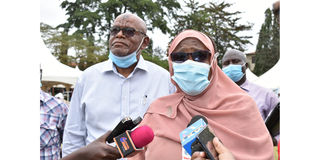Stakeholders decry low education levels in Coast region

Technical University of Mombasa Vice-Chancellor Laila Abubakar and Changamwe MP Omar Mwinyi (left) have decried low education levels in the Coast region.
Coast education stakeholders, led by Technical University of Mombasa Vice-Chancellor Laila Abubakar, have decried low education levels in the region.
Prof Abubakar, the first woman vice-chancellor from the region, urged Coast parents to set good examples for their children so they can excel in their education.
She urged students from the region to work hard and get government sponsorship opportunities to study at public universities.
“There are massive opportunities from the government, including blue economy programmes. Most of our students come from humble backgrounds and they do not know about the available opportunities,” she said.
“Parents and students should take advantage of these opportunities and join universities through government sponsorships.”
She mentioned the “sponsor syndrome’ as a major challenge affecting girls throughout the country, advising parents to mold their children to become better people.
“The sponsor issue is a major challenge. Sometimes these things start at home. The father figure is crucial when it comes to parenting. Most of the time everything is left to the mother and fathers are absent,” she said.
“But we should ensure our children have integrity, self-esteem and are God-fearing. Things are not given on a silver platter.”
She advised students to change their attitudes.
“We must encourage our girls to work hard and motivate them to take up science, technology, engineering and mathematics (STEM) subjects,” she said.
“Enrollment of female students is low, especially when it comes to science courses, which is worse.”
She advised Coast leaders to collaborate and improve enrolment of female students in universities. She attributed the low numbers of female students to wrong priorities by the communities in the region.
“You find that once you finish Form Four you don’t have a role model to tell you that you can go to the university. The next thing is for you to enter into an early marriage,” she lamented.
“In other regions, the community cannot allow a Form Four leaver to get married. As a community, we need to go out there and show that even females can join science courses or universities.”
She urged education stakeholders and leaders to mentor Form Four leavers.
Meanwhile, Changamwe MP Omar Mwinyi, a former teacher, urged students to work hard in their studies and advised parents to make their children’s education a top priority.
But he expressed regret that the region is facing a myriad of challenges in education.
“We must rectify our situation in the Coast. Some areas like Makueni are ahead of us,” he said when he hosted an education fair in his sub-county.
“The number of students going to university in that county is far much higher than the whole of the Coast region. That’s an indicator something is seriously wrong in our society.”
He blamed drug abuse, muguka chewing and absentee fathers for some of the problems young people are facing. He urged coastal communities to deliberate on what is ailing the region.
“They are wasting their time chewing miraa. Those who marry cannot sustain marriages, so we have children who are brought up by single mothers or grandmothers,” he said.
“There’s a lot that is missing. We need to look into family values. We have neglected our cultures and traditions. We must recollect ourselves, reason together and rectify the situation.”
He said the region used to be an academic giant in the 1990s and must reclaim its lost glory.
“Politicians have a role to play, but the society has a bigger role, they cannot abdicate their responsibility. We want change in the education sector.”
Coast children, he said, are equally competitive and bright but they need encouragement to work harder.
“We want to awaken the sleeping giant in our students. Our children should know opportunities are there for everyone.”
He cited several former students from Changamwe who are excelling in international companies, including the World Bank.
“We have our children working in the Food and Agriculture Organization (FAO), Salim Juma in Canada, Nicholas Kiondi in the Middle East working for an oil company. Our children just need to work hard and make the right choices.”
The FAO official, Husna Mbarak, said students need guidance on where to seek opportunities and nurture their talents.
“We must steer the vision of our children,” she said.
Nawwar Hammad, a placement officer with Kenya Universities and Colleges Central Placement Service (KUCCPS) Coast region, advised Form Four leavers to take up government opportunities and further their studies.
“Whatever grade you got, do not stay home idle, you can pursue your higher education. KUCCPS can place you to an institution whatever grade you got right from A to E,” she said.
She said anyone who scored C+ and above can take under government sponsorship a degree course; C and C- diploma courses; D and D+ certificate courses; and D- and E artisan courses.
Jomvu MP Badi Twalib urged teachers to mould children to become better citizens.
“We have bursaries to ensure all our children go to school but students must work hard and excel,” he said.
“We shall deal with underperforming schools. We want good performances. We cannot go on investing in education and then get poor grades.”





